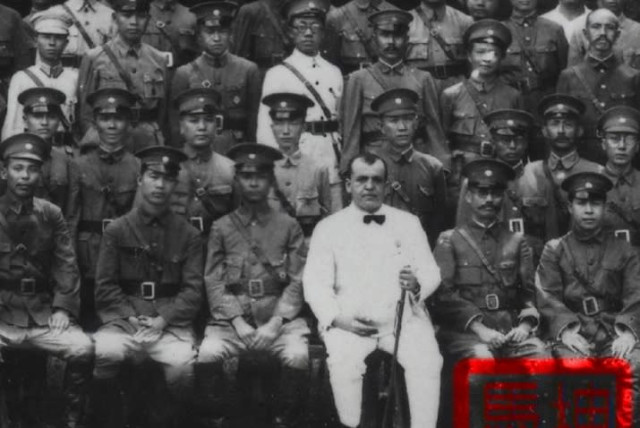Two-Gun Cohen

“Two-Gun” Cohen, surrounded by Chinese troops in 1926. (photo credit: NATIONAL LIBRARY OF ISRAEL)
Morris Abraham “Two-Gun” Cohen (Ma Kun 馬坤 in Chinese) was a Polish-born Jew with an early career of crime, selling fake gold rings and watches when he settled in Winnipeg, Canada, “the Chicago of the North.” After six months in jail for involvement with an underage girl, he became involved with a Chinese gambling joint at a Chinese restaurant, and grew close with the immigrant community. When Sun Yatsen began opening Chinese Nationalist Leagues in North America, Cohen joined Canada’s league, “pledging to devote his life to the service of Sun Yat-sen and the liberation of the Chinese people.”
When Sun launched a counter-revolution against General Yuan in 1912, Cohen helped drill overseas Chinese before they departed to join Sun’s army. As Sun gained power in China, Cohen was hired to organize security for his household in Shanghai in 1922 and soon climbed to higher roles. Cohen also became close with Shanghai’s Jewish community and its chapter of the Betar revisionist Zionist movement; some speculate that Cohen played a role in Sun’s 1920 endorsement of Zionism.
During World War II, Cohen was taken as a prisoner by the Japanese, and after the war ended left China to visit his home in Canada where he waited out the rest of the war and spent time with the Jewish community, where he met his wife. But he soon found he couldn’t keep away from China and by 1946 he was back, as the civil war with the communists raged, unable to find much work beyond giving Zionist lectures with the Betar movement. In 1949, he left the mainland with two million Chinese troops for Taiwan, but soon ended up moving to England to be close with his sister. From there, he continued to make visits between England, China and Taiwan, finding work negotiating airplane contracts with Beijing for Rolls-Royce, and became important in urging the Chinese government’s support for Palestine. Cohen saw himself as “a likely go-between in a possible reconciliation between Taiwan and mainland China.” In Taiwan, he contributed to historical material, but never held an official post or settled there, making only occasional visits.
Cohen was a friend of China’s until his end: he died in 1970 in Manchester and was buried in England, his tombstone paid for by Madame Sun herself. The monument, in English and Chinese, reads “This is the tomb of Ma Kun inscribed by Soong Qingling, vice chairman of the People’s Republic of China Beijing.”
Sources
Ben Zvi, Sara Jo. “The Extraordinary Adventures of Two-Gun Cohen.” Asian Jewish Life, June 2013. https://asianjewishlife.org/pages/articles/AJL_Issue_12_June2013/AJL_Feature_2-Gun-Cohen.html.
Levy, Daniel. “Two-Gun Cohen: Artful Dodger Turned Chinese Legend and Hero of Israel.” The Jerusalem Post, December 27, 2020. https://www.jpost.com/diaspora/two-gun-cohen-artful-dodger-turned-chinese-legend-and-hero-of-israel-652881.